Education and livelihoods for youth also support elderly refugees
The elderly are in a particularly vulnerable position in Uganda’s refugee settlements. With access to education and livelihoods, the community can also create a better future for the family’s seniors.
Seven years ago, Elizabeth Kapinga and her family hid in the bush on their way to the Ugandan border. The family was fleeing the unrest in the Democratic Republic of Congo (DRC) and had to travel on foot for three weeks without getting a lift by car.
“The shots were coming from all directions, and we hurried the children along. Looking back on it, I think about how life has been so hard for us, but I know others are still suffering and losing their lives,” says 80-year-old Kapinga.
Kapinga and her four children, son-in-law, and ten grandchildren have stayed in Rwamwanja refugee settlement since 2013. In the DRC, Kapinga lost her spouse, four children, and three grandchildren, and thinking about them makes her sad.
“I had a good life. I got married, and I was happy. Then the Lord separated me from my husband, and I was all alone,” says Kapinga.
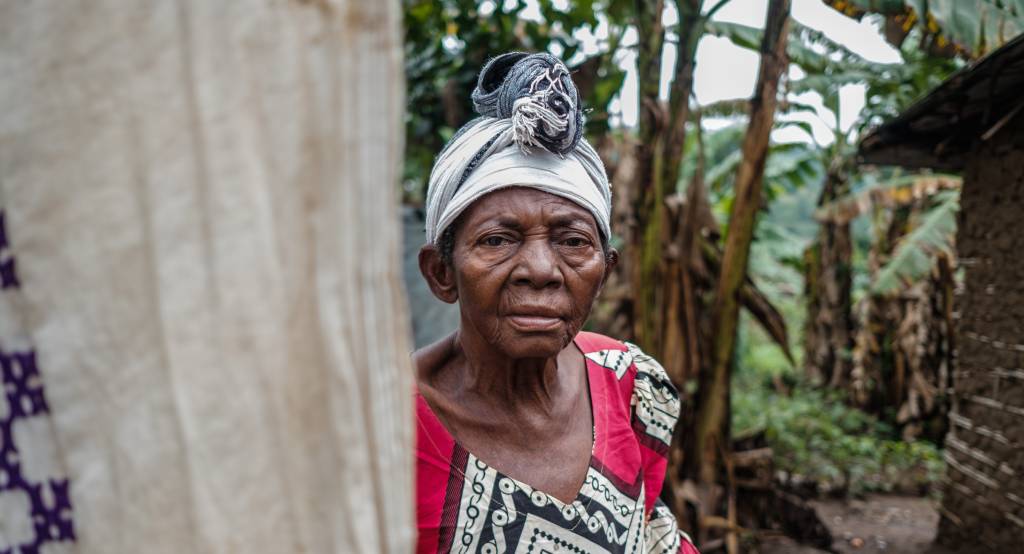
Elizabeth Kapinga lives in Uganda as a refugee. She says that returning to her home in the DRC is unlikely.
Uganda hosts 1,4 million refugees. Most of them come from neighbouring countries, such as the DRC, where several armed groups fight each other. The conflict is dangerous to civilians. The unrest has cost people their homes and possessions, and particularly women face the threat of violence and rape.
Kapinga’s family is safe, but their daily life is challenging. The refugee settlement faces a shortage of many necessities, and for many families, the food assistance available is not enough for surviving. The availability of health care services and medicine is low, and the prices are high.
Kapinga’s family’s situation has improved since her son-in-law Lucien Kagoro graduated from the Technical Vocational Education Training (TVET) centre established by Finn Church Aid (FCA) in Rwamwanja. Kagoro joined his extended family in Rwamwanja in 2017 after working as a teacher in the DRC. He could not find work in Ugandan schools because of language barriers, but the vocational training opened up a new career path for him and many other youths.
Kagoro trained to become a hairdresser, and he now runs a successful salon. His work secures a livelihood for the whole extended family and enables the children to go to school. Kagoro lost his parents in the conflict, and his wife’s family, including his mother-in-law, is the only family he has.
“I love my mother-in-law. She has given me so much. My family is doing well now,” says Kagoro.
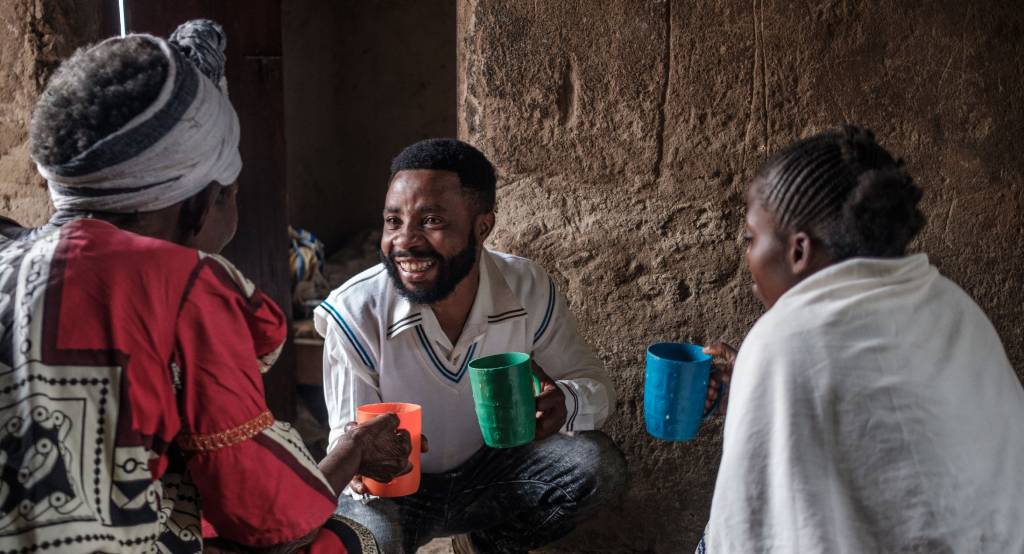
Lucien Kagoro supports his extended family. The wellbeing of his mother-in-law is essential to him.
After the hardships in his home country, Kagoro says that he now lives in peace in Uganda.
“I’m happy with the life we have now,” says Kagoro.
Grandmother Kapinga likes to spend her days with her grandchildren. Watching the children play takes her mind off unpleasant memories. A secure livelihood gives her the chance to enjoy her daily life.
“I’m happy for my son-in-law’s work. He enjoys it, and it enables him to take care of us. I don’t know how we would manage if Lucien didn’t have his salon,” says Kapinga.
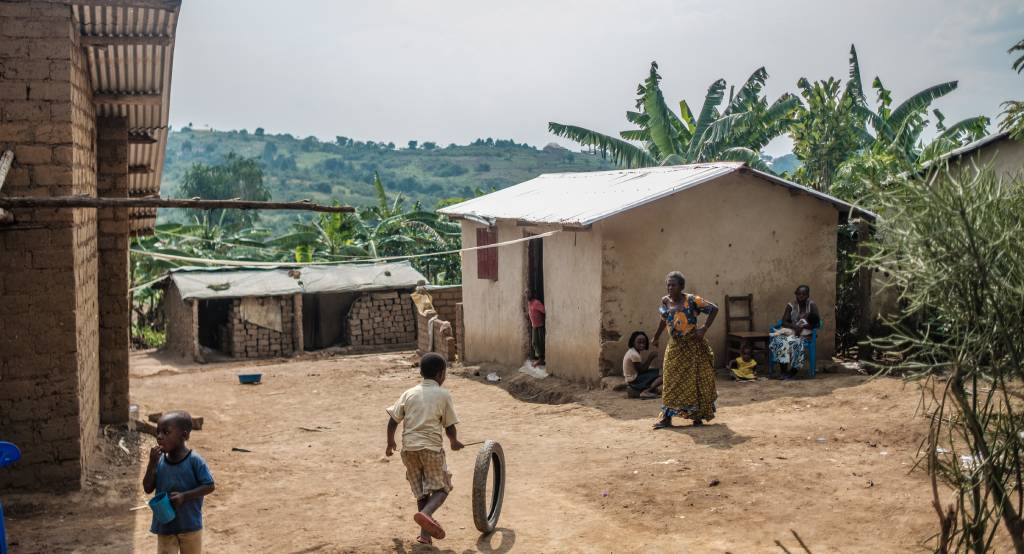
The refugee settlement faces a shortage of many necessities.
In the vocational education centre, 70 per cent of the students are refugees from the DRC. Out of the young people who have completed their training, more than 70 per cent have found employment or started their own business.
“Educating children and youth is a way of building the future and investing in the sustainable development of entire communities. After the urgent emergency relief, we start building the future of families through education and livelihoods,” says Eija Alajarva, Head of Humanitarian Assistance at FCA.
Advanced age and life experiences bring with them injuries and illnesses that complicate mobility and access to information. It is essential to do outreach work and provide help in the home when working with the elderly and persons with disabilities.
“When people are forced to flee, families may fall apart. Members of a family may not end up in the same refugee settlement, and while families normally take care of the elderly, that can change in a crisis,” says Alajarva.
The constant threat of violence also drove Maria Nyrambagazohe, 67, to flee her home village in the DRC with her two grandchildren. They fled on foot, which forced them to leave all their belongings behind. Since 2018, the family lives in Kyaka II refugee settlement in Uganda.
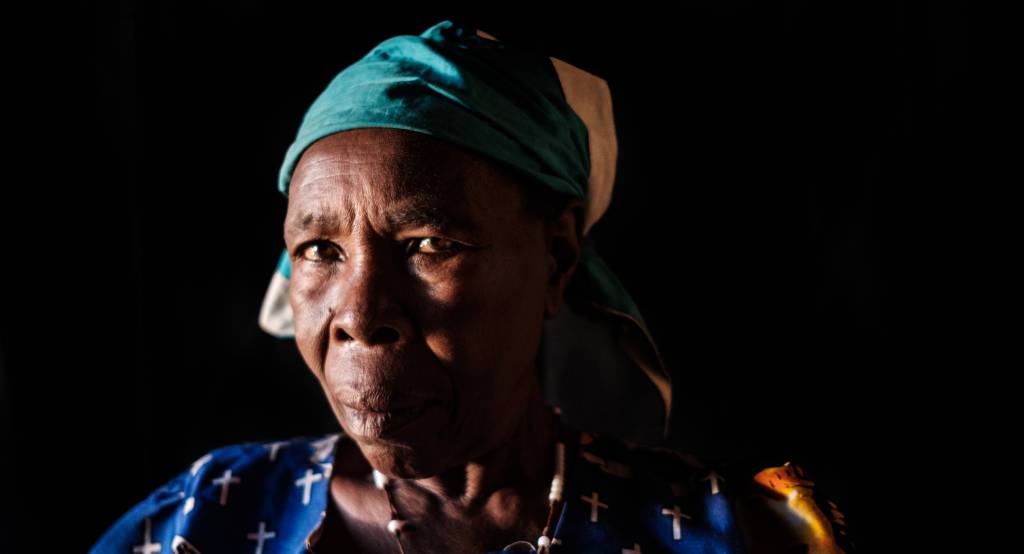
Maria Nyrambagazohe is often sick, which makes working and household chores hard for her.
Nyrambagazohe’s husband and two sons lost their lives in the unrest. Her daughter, the mother of her grandchildren, remained in the DRC. The family does not know whether she is still alive. Nyrambagazohe is now the guardian of Anarite, 8, and Sylvester, 10.
“I think about my family every day. The children keep asking when they get to see their mother again,” says Nyrambagazohe.
While the refugee settlement is peaceful, the family’s day-to-day life is tough. Nyrambagazohe and the children are often sick, and work exhausts her quickly, causing her all kinds of ache and pain. The children support her with household chores, such as cleaning and fetching water.
The elderly are respected and have an important role in communities, and people want to take care of their wellbeing. In times of crisis, they might still end up as caretakers. If the parents have died or are otherwise absent, the grandparents – often the grandmothers – have to take care of their grandchildren.
The biggest challenge of Nyrambagazohe’s family is hunger. Because of her age and condition, she cannot work, and the family lives in poverty. Like many other families in the refugee settlement, they all receive 21,000 Ugandan shillings per month as a World Food Programme (WFP) assistance for food. The money can get them 8 kilograms of cornmeal, an equal amount of beans or 1.5 kilograms of meat.
“It is not easy for the children to be hungry all day long,” says Nyrambagazohe.
For most elderly refugees, returning to their home country might not be possible. Nyrambagazohe misses her friends and other villagers back home. In Uganda, she often feels lonely, but she says she enjoys the peacefulness.
” I never used to be able to sleep before, but now I sleep well, she says.
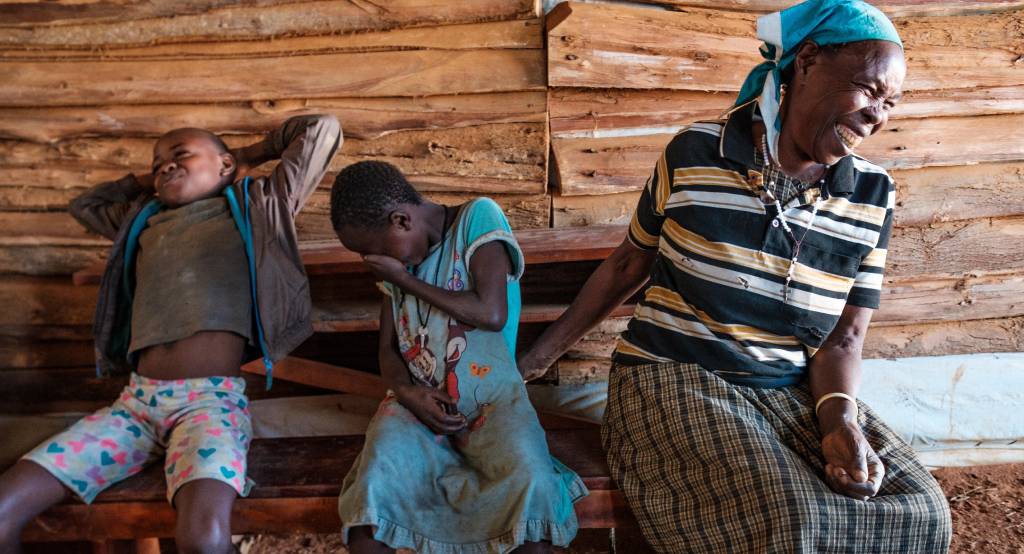
The joy of the children delights their grandmother. Her biggest wish is that they will have a good future.
Anarite and Sylvester are used to their life in the refugee settlement. They play football and skip rope with the neighbourhood’s children. Watching them play makes Nyrambagazohe happy. When her grandchildren can go to school, she knows they can have a future.
“We are grateful for the support for school materials, fees, and clothing. Education will enable the children to find employment and care for their families when they grow up,” says Nyrambagazohe.
Photos and interviews in Uganda: Sumy Sadurni
Text: Noora Pohjanheimo
Translation: Leena Vuolteenaho